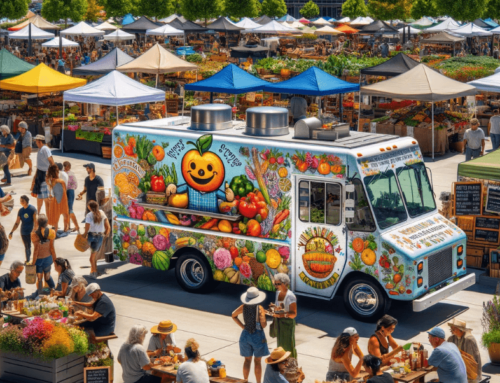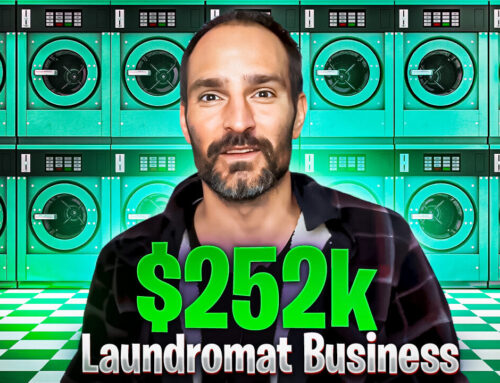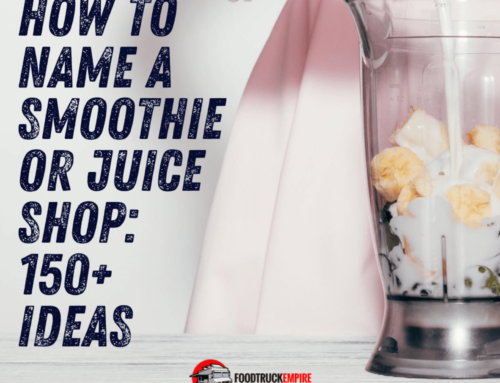Food trucks are advertised as a cheap way to start a business. But if you’re planning to get into the food truck business solely for the reason of low startup cost think again. The initial investment and on-going monthly costs are significant and can quickly ratchet up to $50,000 – $100,000 or more depending what what you’re looking for.
In this article, I outline the startup costs and ongoing expenses of operating a food truck business and provide a spreadsheet you can use to estimate the total cost to open.
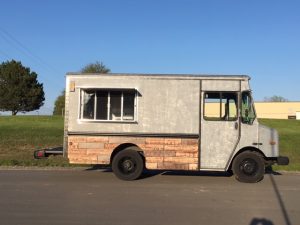
Box van converted into a food truck.
This is a smart exercise to go through if you’re in the process of drafting a food truck business plan. You need to understand all the initial and ongoing expenses associated with starting this business.
Food Truck Expense Breakdown – Download this spreadsheet and plug-in your own numbers to get an overall estimate of what it will cost to get the business up and rolling. Copy and paste from the Google Doc.
Food Truck Startup Cost Spreadsheet
We encourage you to download the food truck cost spreadsheet to estimate how much starting your vehicle would cost. Remember that every city / state will have different laws and requirements so your cost will vary. This spreadsheet is a great way to get you in the ball-park for a cost estimate.
| Food Truck Start-up Costs | ||
| Equipment | Estimated Cost | Notes |
| Food Truck + Wrap & Equipment | $25,000 – $100,000 | Feel free to add your personal notes here. |
| Initial Product Inventory | $1,000 – $2,000 | |
| Permits and Licenses | $100 – $500 | Varies a lot depending on where you operate. |
| Website | Free – $5,000 | Varies a lot depending on what you want. |
| Facebook / Twitter | Free | |
| Register / POS | $200 – $1,000 | Can also use an iPad and an app for credit transactions. |
| Uniforms / T-Shirts | $0 – $1,000 | |
| Paper Products (Plates / Napkins, etc.) | $200 – $300 | |
| Misc. Expenses (Like a Chalk Menu) | $500 – $2000 | Plan for some unexpected expenses here and put it into the budget. |
| Smallwares: Pots, Pans, etc. | $1000 – $2000 | |
| Fire Extinguisher | $100 – $300 | |
| Total Low End | $28100 | |
| Total High End | $114100 | |
| Food Truck On-Going Costs | ||
| Item | Monthly Estimated Cost | Notes |
| Commissary / Commercial Kitchen | $400 – $1,200 | Varies greatly depending on location and services provided by commissary. |
| Phone / Internet | $100 – $200 | |
| Fuel | $500 | This will vary a lot. |
| Labor | ??? | $8 – $15 per hour is average rate. |
| Repairs | $1000 | Better to budget for it. |
| Food / Beverage Restock | ??? | Depends on food cost and frequency of operation. |
| Paper Product Restock | ??? | Depends on food cost and frequency of operation. |
| Social Media Marketing | $0 – $500 monthly | Most food truck operators manage social media accounts themselves at no cost. |
| Total: | $40,000 – $125,000 |
Variable Expenses You Need to Know About
There are all sorts of variable expenses to understand before becoming a food truck owner. These costs will differ depending on where you live and plan to operate the business. Here are some items to understand when trying to figure out how much it will cost to open your business.
Permit Cost: This is an extreme example. But if you plan to operate a hot dog cart in New York City near the zoo you can expect to pay a fee of $289,500 per year to operate. Fortunately, most places in the United States only require a few hundred dollars to a few thousand per year to legally operate and serve food. In general, if you live in a large coastal city, expect to pay more to get started than you would in middle America. Take a look at my license and permit checklist here to find out how much it will cost in your area.
Commissary or Commercial Kitchen Requirements: Depending on the regulations of your city, you may be required to use a commissary or commercial kitchen. Commissary costs can run from $400 – $1,500 per month depending on the services that are provided and location.
Insurance: You’ll also need to pay for insurance that can easily run from $2000 – $5000 per year depending on the coverage level and the frequency you plan to operate the truck. You will need to pay for business insurance and vehicle insurance to legally operate.
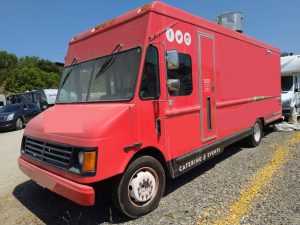
Buying a used food truck can save you money.
Renting VS Buying: Some food truck owners decide to rent their food truck instead of buying it. The advantage to renting is that you don’t need as much money for a down payment. Unfortunately, renting a food truck is usually pretty expense. You can expect to pay $3,000 – $5,000 per month to rent a truck.
Most food truck operators decide to buy their own food truck. As you can see from the estimate above, you can get a loan on a new food truck for less than you can rent it. The only situation I recommend renting is if you want to test out the business for a month or two before going all in.
Join Now: Sign Up For The Food Truck Business Kit (Includes 20 page guide + business plan)
Food Truck VS Trailer VS Cart: If you want to save money, the simplest way to do it is to buy a food trailer or cart instead of a food truck. With a food trailer you can expect to invest $20,000 – $60,000 depending on equipment and wrap. With a small food cart, you might be able to get started for less than $20,000.
With either of these options, you don’t get an engine so that really cuts down the total cost. But keep in mind, you’ll still need to find a way to pull the trailer if you go this route. If you don’t own a truck already, you could end up spending about the same to get started either way.
Cooking Equipment: Write down the list of cooking equipment you’ll need to make the menu. Sit down and think about each piece of equipment you’ll need to make whatever. Then figure out how much each piece is going to cost.
Every food truck requires different equipment. If you’re starting a coffee truck, you’ll need an espresso machine, coffee grinders, refridgerator and coffee maker onboard. If you want to open a French fry truck, you’ll need deep fryers. If you’re selling burgers, you’ll need a grill. Write this down and add up the cost to get the most precise estimate of startup cost possible.
How to Pay for a Food Truck Business
After you get the cost estimate figured out, you’ll have a clear understanding on how much fundraising you’ll need to do. Some of you will have enough money savings to cover the costs. If this fits your situation, no need to read further.
But for the majority of you reading this now, you’ll probably need some type of a loan to buy the truck. Fortunately, you can usually get a low-interest loan on a food truck similar to the way you can get an automobile loan assuming you have a good credit score. Other common ways to fund a food business include cashing out retirement accounts like 401Ks, putting the expenses on a credit card, or crowdfunding.
After you determine how to fund your business, I also suggest figuring out how many meals you’ll need to sell per month to cover the ongoing expenses and loan payments. Here’s a simple way to think about how much revenue you’ll need to make to cover your expenses.
Basically, you’ll want to make a rough estimate on how many sales you’ll need to make monthly to cover the bills. Then take a time out to figure out if the volume of sales you’ll need to make is realistic.
$10 average meals X 500 meals per month = $5,000 in gross revenue.
Based on a rough profit margin of 33% profit-margin based on sales would be $1,650. Conduct your own back of the napkin analysis to estimate whether or not you’ll be able to cover your monthly expenditures.
The Myth of the “Cheap” Food Business
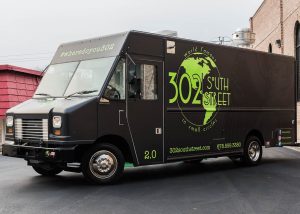
These things aren’t cheap.
A couple reasons food trucks are considered a low-cost business is that you don’t need to sign a lease for single restaurant location and can get by with few employees if you plan to manage the day-to-day operations yourself. These advantages are true, but that doesn’t mean there won’t be overhead as I’ve demonstrated below.
Bottom line, don’t start a food truck just because it’s “cheap.” Sure, you’ll be able to get into this type of business for less than you could a brick-and-mortar restaurant location, but it’s still not a low cost business.
If your goal is to start the lowest cost food business possible, consider looking at a push-cart or tent. Depending on your menu, you may be able to start a business with nothing more than a tent and minimal cooking equipment. If things work out with the tent, you will have proven your business idea and can move forward with a larger investment.
Reader Warning: Most experienced and successful long-term food truckers will tell you that opting for the cheapest vehicle and equipment isn’t the way to go. The vehicle truly is the heart and sole of your business and investing in better quality equipment can help reduce repair frequency and help ensure you’ve got more up-time.
I’ve also talked with food truck owners that couldn’t pass their health inspection because their food truck didn’t have the correct fire suppression system installed. Cutting corners to save a few dollars in startup cost isn’t always a good idea.
Here are a few supplementary resources you can use to get a wider swath of perspectives on the costs of operating a food truck:
Food Truck Case Study – This is a case study with Anthony Salvagno that takes you through the full-process of starting a food truck in real time. There’s a full episode on how much was invested in the food truck. If you want a real-world example of how to start a food truck this series is it.
Are Food Truck Start Up Costs Low? – Eric Silverstein is the owner of The Peached Tortilla, an award winning food truck in Austin, Texas. In this article Silverstein shares his perspective on the topic of food trailers being a low-barrier to entry business.
Food Truck Economics – In-depth breakdown and analysis of the expenses of operating a food truck. Recommended reading.
Food Truck Business Kit – Sign up for my 20 page guide that explains what you’ll need to get started.



